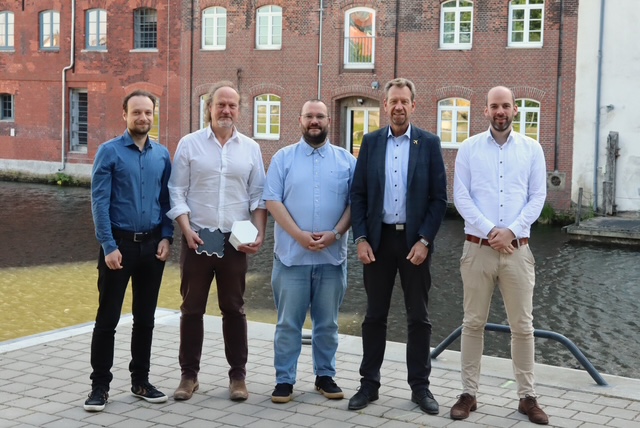Teccon hit on the idea after an employee purchased a house and wanted to render the façade more energy efficient. "We then discussed how to simplify insulation and make it more efficient and ecological using new, innovative processes?" said Oliver Grunewald, architect at Teccon. The company then teamed up with the Institute for Industrialisation of Smart Materials (ISM) at TUHH to conduct a feasibility study which is nearing completion.
Teccon Consulting & Engineering and the Hamburg University of Technology (TUHH) are conducting a feasibility study on combining traditional insulation materials such as hemp and straw with modern 3D techniques for the façades of buildings. Hopes are now high that the combination can lead to fully recyclable, CO₂-neutral, cost-effective production. The study is funded by IFB Hamburg's PROFI Umwelt scheme.
Making insulation simpler, more efficient and more ecological

Printing insulation boards on construction site
3D printing is now being used for metals and plastics, but not natural materials. This technology is still in its infancy, said Maximilian Keller, Project Engineer at ISM. Wood or hemp fibres can be printed as a paste. "We have identified materials and structures that are suitable for insulation. The potential is there, but the path is not easy," he said. The challenges are not just technical. The material has to meet various requirements i.e., fire protection to be certified and approved. Eventually, the engineers hope to print the insulation panels on the construction site, customised to the façades. The material will be fully recyclable and save up to 90 per cent of CO₂ emissions over conventional EPS insulation, and significantly cheaper.
Tests on detached houses and small properties
If all goes well, the first 3D printed sustainable insulation panels could be on the market within two to three years. "That's where we're heading," said Jörg Manthey, Director of Business Development. The technology will initially be tested on single-family homes or small properties before the possibility of scaling up is considered. Tecon engineers may become producers later on. "Perhaps we will also enter a partnership later. That hasn't been decided yet," added Manthey.
IFB Hamburg supports feasibility study
The feasibility study received €128,000 from the IFB Hamburg's PROFI Environment (Transfer) scheme as part of the Green Potential Screening funding call. The scheme funds the development of innovative, marketable products, processes or services and provides up to €500,000 for individuals and up to €1 million for collaborative projects. Companies in all sectors and technologies, as well as cooperating universities or research institutions, are eligible for funding. Teccon has previously received funding from IFB Hamburg. "As an engineering firm, we would not be able to carry out the research without this support. We also would not have been able to realise this study without the funding," said Manthey.
mm/kk/pb
This article was written in cooperation with IFB.
Sources and further information
IFB Hamburg
The Hamburgische Investitions- und Förderbank (IFB Hamburg) is the main development bank in Hamburg. It focuses on housing, urban development, the economy, innovation and the environment. IFB Hamburg funds investment projects in Hamburg on behalf of the state and grants loans, subsidies and equity investments as well as providing security.
More
Similar articles

Zellerfeld R&D produces 3D printed shoes

UKE testing 3D-printed medication

3D project planners now used for building in Hamburg
